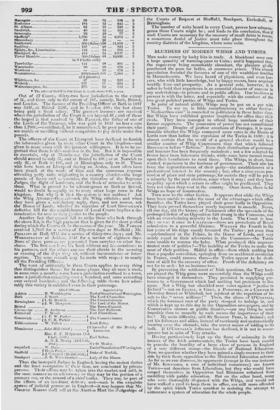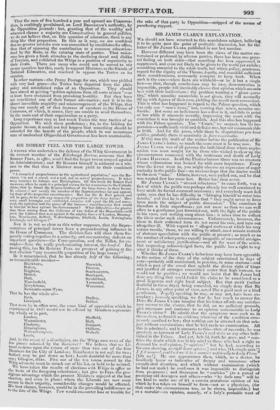BLUNDERS OF MODERN WHIGS AND TORIES.
MEN make money by lucky hits in trade. A blockhead once sent a large quantity of warming-pans to Cuba; and it happened that; the sugar-crop being remarkably abundant, the planters gladly purchased the pans for ladles, at enormous prices. This absurd speculation founded the fortunes of one of the wealthiest families. in Massachusetts. We have heard of physicians, and even law- yers, who with little knowledge, but by happy events, have acquired worldly finne and prosperity. As a general rule, however, it is safest to hold that experience is an essential element of success in any undertaking—in private and in public affitirs. Our business at present is with the latter, and especially NVitll the COIRiliet of the two great political parties of Whigs and Tories.
In point of natural ability, Whigs may be put on a par with
Tories. To say so, is little M complimentary to either faction:
ediocr i ibus ease" is conceded to politicians n these latter class.
But Whigs have exhibited greater inaptitude for office than flair rivals. They have managed to offend large numbers of their former supporters. The possession of power has not consolidated their party. Despite of profuse creations of Peerages, it is ques- tionable whether the Whigs command more votes in the House of Lords now than before the expulsion of the Tories in 1830 : it is almost certain that the result of a general election would be a smaller !minim' of Whig Commoners than that which followed BROUGHAM before "Reform." Even their distribution of patronage and honours has been frequently maladroit ; not a few selected for flivour have been lukewarm Mends, while sonic have turned round upon their beneffictors to rend them. The Whigs, in short, have wanted experience in the business of government. Their aim has been the aggrandizement of their party—the establishment of a predominant interest in the country l • but, after a nine-years pos- session of place and state patronage, for certain they will be put in a minority by the next election, come when it may; and they have no policy upon which a return to office might be predicated. They have not taken deep root in the country. Once down, there is for Whigs no hope of resurrection.
Turn now to the other flustion. It appears that while the Whigs
have been unable to make the most of the advantages which office furnishes, the Tories have played their game badly in Opposition.. They have proved themselves nearly impotent in assault. Never, till our day, did the history of Parliament offer the spectaele'of time prolonged defeat of an Opposition 320 strong in the Commons, and with an overwhelming majority in the Lords. The Court is hot-. tile : so was it once to CHATHAM—there are precedents of Royal submission to a powerful Minister. WILLIAM the Fourth in the last years of his reign openly favoured the Tories : yet even then. —predominant at the Palace, in the House of Lords and very nearly equal to their adversaries in the Commons—Ate Tories were unable to resume the helm. What produced this unprece- dented state of polities ?—The inability of the Tories to make the most of their position. Skilful in office—from which nothing less than a popular convulsion, springing from an accidental revolution in France, could remove them—the Tories appear to be desti- tute of skill for the recovery of office. Proofs of the deficiency are not far to seek : let us instance two.
By preventing the settlement of Trish questions, the Tory lead-
ers played the Whig game more successfully than the Whigs could have managed it themselves. They persisted in supplying pre- tences to a Government which had nothing but pretences to live upon. Not a Whig but chuckled over votes against "justice to Ireland "—not an lewor, a Glans-, a Pomo:ow, or a COWPER la Downing Street or White'hall, but rejoiced at the repetition of in- sult to the " seven millions ! " Then, the abuse of O'Ciesxam.,
which the foremost men of' the party stooped to indulge in, and which is kept up to this day in the Opposition newspapers, and by Conservative orators at public dinners,—can any thing be more impolitic than to magnify by such means the importance of their
foe My main difficulty, said Sir Ronan' PEEL, is Ireland ; and yet his folios% era and allies, instead of' cautiously and systematically wearing awny the obstacle, take the surest means of adding to its bulk. If O'Cox NELL'S influence has declined, it is not in conse- quence but in spite of Tory attacks. Having pertineeiously kept up the flame of animosity in the breasts of the Irish potato-eaters, the Tories have been careful to provoke the hostility of a large class of persons in England of a very diffigent stamp—the friends of National Education:. Now, we question whether they have gained a single convert to their side by their fierce opposition to the Ministerial Education scheme. As far as we can discover, its opponents (except in the one instance of Mr. KINNAIRD, a case of individual conscience) are known Tories—not deserters from Liberalism, but they who would have ranged themselves in Opposition had Ministers refrained from meddling with public education. But on the other hand, ninny who were thoroughly disgusted with the Whigs, and would not have walked a ynrd to keep them in office, are still more offended by the spirit which Tories manifest in resisting the attempt tO .commence a system of education for the whole people.
. •
:That the man ef fiVe hundred a year and upward are Conserva- the sake of that party hi Opposition—stripped of the means of
tics, is exultingly proclaimed, on Lord Bamionam's autlithity, by put -chasing Support.
die oppositiee journals : but, granting that of the wealthy and heated classes . a majority are Conservatives in general polities, we do. net believe that, on this question of education, there is any thing like that proportion. Be this as it may, we are confident that no greater mistake ever was committed by candidates for office, than that of opposing the contribution to a common education- fund by the State, in the existing state of parties. That resist- ance has given a fresh stimulus to the declining dread and dislike of Toryism, and exhibited the Whigs in a position of superiority to their rivals. There are many who could not be moved to stir on any question but this, ready to support Ministers as the friends of National Education, and resolved to oppose the Tories as its enemies. •
In other matters—the Penny Postage for one, which was yielded with very bad grace—the Tories have departed from the plain
policy and established rules of an Opposition. They should have aimed at gaining "golden opinions from all sorts of men "—or at least have abstained from provoking hostility. But they have not conciliated one of their former adversaries ; and it is to the almost incredible stupidity and mismanagement of the Whigs, that they owe nearly all of that increase of numbers in the House of Commons, of which, it seems, they arc unable to avail themselves, for the main end of their organization as a party. Long experience may at last teach Tories the true tactics of an Opposition. We wish them proficiency ; for, in the bidding for popular ilivour, it could not but happen that something should be conceded fbr the benefit of the people, which in our monstrous state of unchecked Oligarchical Government has been unattainable.



























 Previous page
Previous page